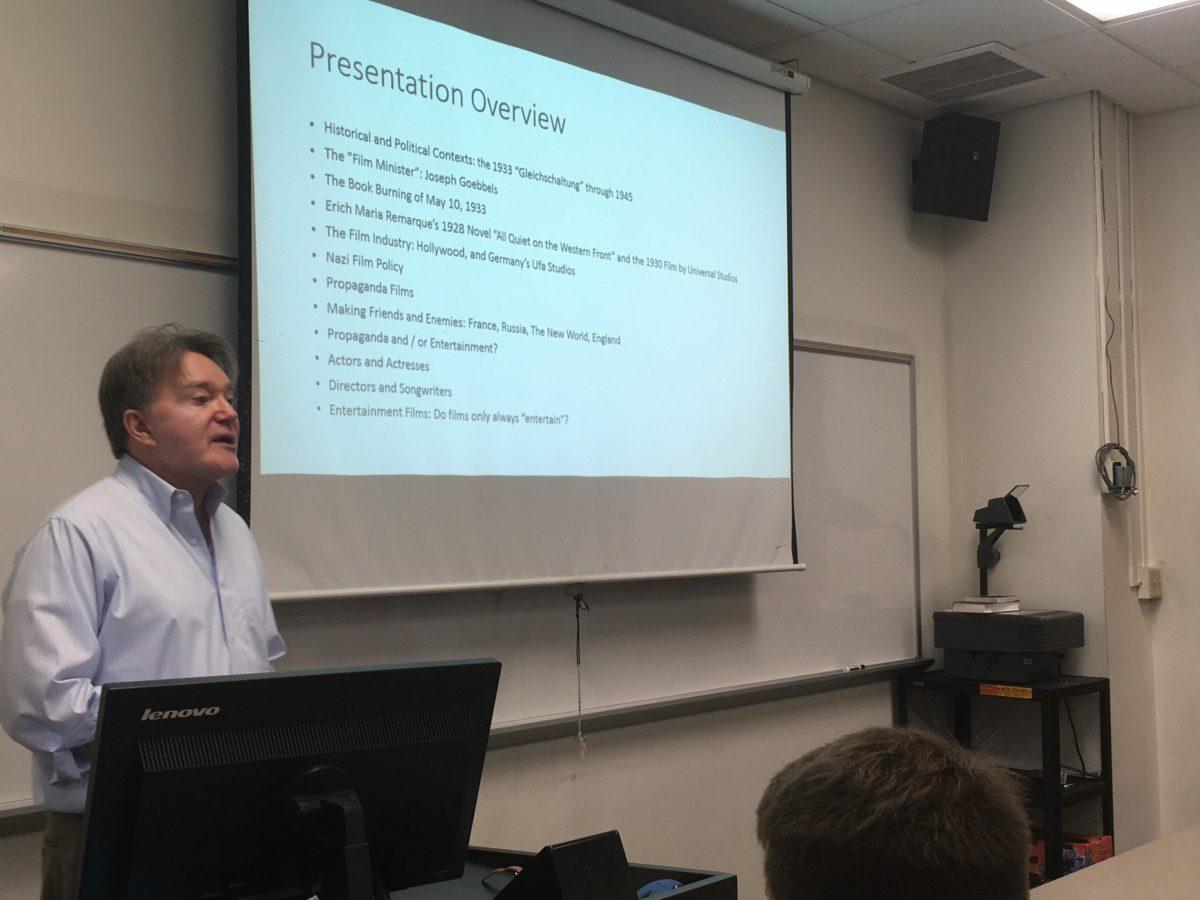Thursday afternoon in Bunce Hall, as part of the Rowan Center for Holocaust and Genocide Studies yearly curriculum of events, Dr. Edward Smith presented a program with a question and answer session afterward on filmmaking during the rise and rule of the Nazis.
Smith, who teaches as a professor in the department of Foreign Language and Literature in the College of Humanities and Social Sciences used the talk to give attendees a background on filmmaking during that period. He noted that while the overwhelming notion of Nazi films during that time revolved around propaganda pictures, a majority of the roughly 1,100+ films made in that time period were fantasies, comedies and other genres that acted as an escape for regular German citizens.
In fact, Smith noted that Nazi propaganda minister Joseph Goebbels explicitly told directors to stay away from political topics in their films, and reviewed every film before release to make sure that it conformed to his standards of propaganda. Smith also talked about UFA studios in Germany, which was the largest filmmaker and distributor nationalized by the Nazis starting in 1942.
As part of the presentation, Smith also played clips from a variety of different German films of the era, including S.O.S. Eisberg, a drama film that starred future propaganda filmmaker Leni Riefenstahl. Another film shown was The Twelve Chairs, a comedy based on the novel. He also showed clips from movies of the period that were not overtly propaganda but had themes relevant to the Nazi party’s interest.
For Smith, his end goal with the presentation was to ask the students and educators assembled if this form of entertainment had subliminal messaging intertwined and ask if it was acceptable and appropriate for the time period.
“The question of the entire presentation was, do entertainment films also contain propaganda,” Smith said. “There were terrible things happening at the time, [including] the Holocaust, the invasion of various countries. But this was sort of a relief for the Germans of the period and you asked yourself then, should they have been relieved of the tremendous burden that was happening at the time?”
Junior History and Secondary Education major Eric Viereck Jr. was one of the students in attendance. He echoed Smith’s statements and said the presentation helped to deepen his understanding of that era in German film.
“I thought it was very interesting,” Viereck said. “I always thought that the Nazi German films were all propaganda, but my astonishment was that most of them were your usual Hollywood films that were [made] back in the 1930s and 40s. But it’s so interesting that most of the propaganda films were to a minimum, and they mostly wanted to do more lifestyle and culture. So that’s what astonished me, I never knew that they did films to be like Hollywood.”
The next event on the center’s calendar is an international studies talk on North Korea on Monday, April 9, at 3:30 p.m. It will take place in James Hall room 2103.
For questions/comments about this story, email [email protected] or tweet @TheWhitOnline.

























































































































































!["Working with [Dr. Lynch] is always a learning experience for me. She is a treasure,” said Thomas. - Staff Writer / Kacie Scibilia](https://thewhitonline.com/wp-content/uploads/2025/04/choir-1-1200x694.jpg)









































